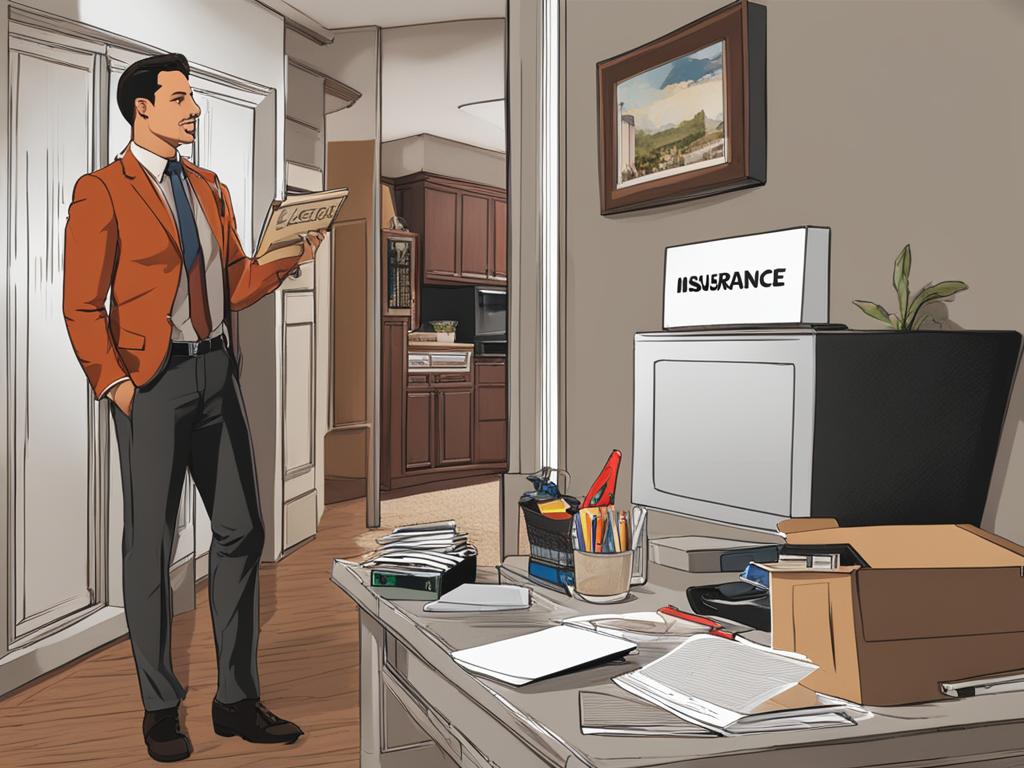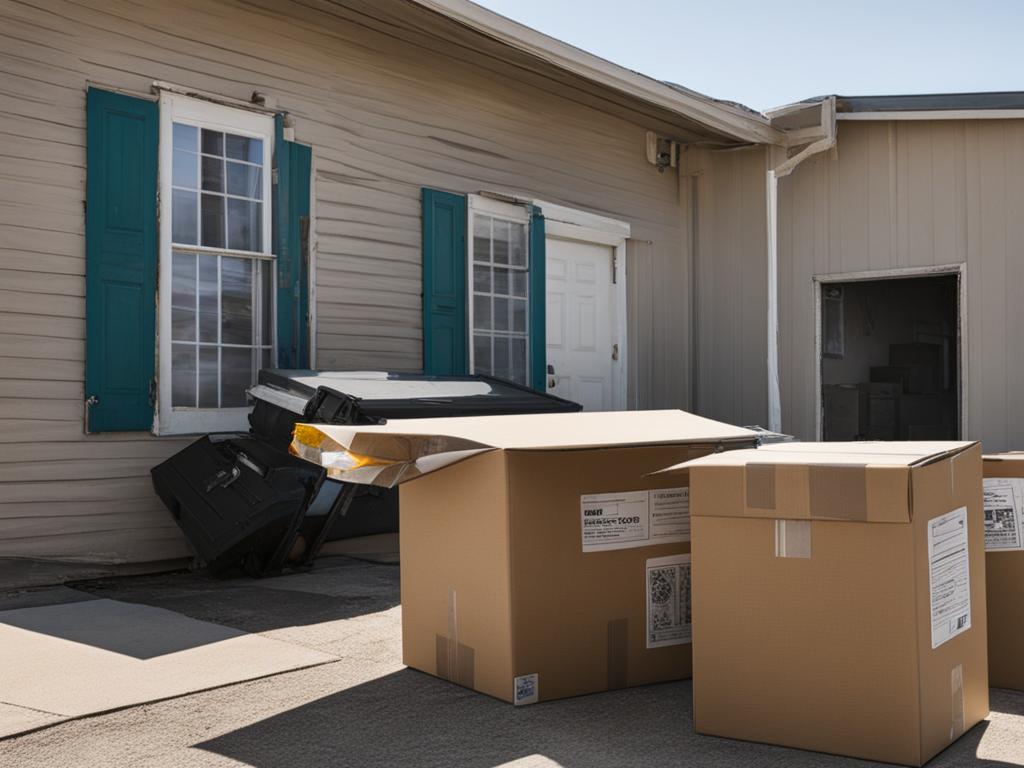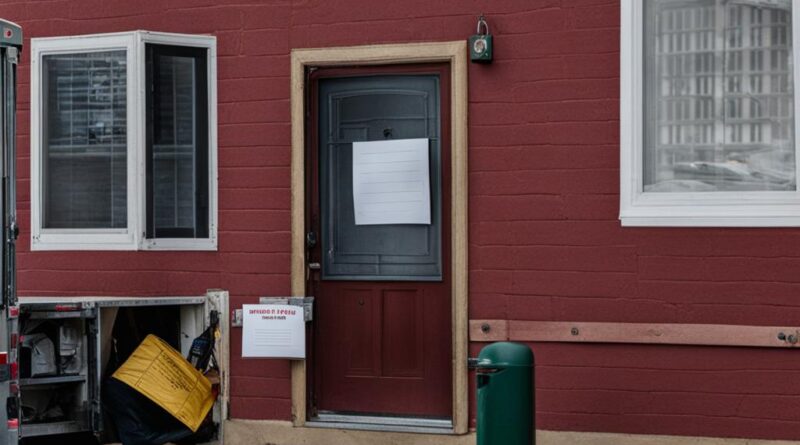Can You Get Evicted for Not Having Renters Insurance? Find Out Now!
Renters insurance is essential for protecting yourself from financial losses and unexpected expenses. While not having renters insurance may not always result in eviction, it can leave you vulnerable and at risk. Understanding the consequences and benefits of having renters insurance is crucial.
Key Takeaways:
- Not having renters insurance may not always lead to eviction, but it can leave you financially vulnerable.
- Renters insurance provides coverage for personal property and liability, protecting you from significant financial losses.
- While landlords may require renters insurance, eviction laws vary by state and municipality.
- Landlords can’t force you to have renters insurance, but they may include it as a requirement in the lease agreement.
- Not having renters insurance can have significant implications for tenants, including difficulty finding new housing.
Understanding the Importance of Renters Insurance
When it comes to renting a property, having renters insurance is essential for protecting yourself from potential financial losses and unforeseen expenses. While eviction may not directly result from not having renters insurance, the consequences can still have a significant impact on your financial well-being and peace of mind.
Renters insurance offers coverage for both personal property and liability. Without this coverage, you run the risk of facing substantial financial losses if your belongings are damaged, stolen, or destroyed. Additionally, if someone sustains an injury on your rental property and you are found liable, you may be responsible for their medical expenses and other related costs.
Not having renters insurance can leave you vulnerable and at risk. It’s crucial to understand the potential consequences of not having this type of insurance.
While eviction may not be an immediate consequence, not having renters insurance can create other challenges. Many landlords require tenants to have renters insurance as part of the lease agreement. Failure to comply with this requirement could result in legal action and possible eviction. Additionally, without renters insurance, it may be more difficult for you to find new rental housing, as many landlords prioritize tenants who have this coverage.
It’s important to prioritize your financial security and protect yourself from potential risks by obtaining renters insurance. This coverage offers peace of mind and ensures that you are prepared for unexpected events that could result in financial hardship.
What Does Renters Insurance Cover?
Renters insurance provides comprehensive coverage for tenants, offering protection for personal property, liability, and additional living expenses. It safeguards your belongings from theft, fire, and other covered perils, ensuring that you have financial support in the event of unexpected losses. In addition, renters insurance provides liability coverage, covering medical expenses and legal fees if someone is injured on your rental property and you are found responsible.
Renters insurance also includes coverage for additional living expenses, which can be crucial in situations where your rental property becomes uninhabitable due to a covered incident. This coverage helps with expenses like temporary accommodation and meals while your home is being repaired or rebuilt.
While landlords may require renters insurance as a part of the lease agreement, eviction laws vary by state and municipality, and eviction is not always a direct consequence of not having renters insurance. It is important to review your specific lease agreement and understand the requirements set by your landlord.
| Coverage | Description |
|---|---|
| Personal Property | Covers the cost of replacing or repairing your belongings if they are damaged or stolen. |
| Liability | Provides coverage for injuries that occur on your rental property and any resulting lawsuits. |
| Additional Living Expenses | Covers the costs of temporary accommodation and other living expenses if your rental property becomes uninhabitable. |
Having renters insurance offers peace of mind, knowing that you have financial protection against unforeseen circumstances. It is advisable to consider renters insurance as an essential safeguard for your belongings and liability, ensuring that you are prepared for any potential risks or losses.
Can Your Landlord Force You to Have Renters Insurance?
While landlords cannot necessarily force tenants to have renters insurance, they may include it as a requirement in the lease agreement. Failure to comply with the lease terms, such as not obtaining renters insurance, can lead to legal action and possible eviction. It’s important to review your lease agreement and understand your obligations.
Renters insurance is an essential form of protection for both tenants and landlords. It helps protect tenants from financial losses caused by unexpected events such as theft, fire, or damage to personal belongings. Additionally, renters insurance provides liability coverage, which can protect tenants if someone gets injured on their property and decides to sue.
From the landlord’s perspective, requiring renters insurance can help protect their property and other tenants. For example, if a fire in one unit spreads to other units, renters insurance can help cover the damages and prevent the landlord from facing significant financial losses. Requiring renters insurance also encourages tenants to be more responsible and cautious, reducing the risk of accidents and property damage.
Understanding Lease Agreement Requirements
When signing a lease agreement, it’s crucial to carefully read and understand all the terms and conditions. Some lease agreements may explicitly state that renters insurance is a mandatory requirement. In such cases, tenants must obtain a renters insurance policy and provide proof of coverage to the landlord.
If you have concerns about the requirement for renters insurance, it’s recommended to discuss them with your landlord or property management company. They may be willing to address any questions or provide additional information to help you understand the importance of renters insurance.

| Pros of Renters Insurance Requirement | Cons of Renters Insurance Requirement |
|---|---|
| Renters have financial protection in case of unexpected events. | Additional cost for tenants who may already be on a tight budget. |
| Helps prevent disputes between tenants and landlords in case of damages or liability claims. | Some tenants may have difficulty qualifying for or affording renters insurance. |
| Encourages responsible behavior and reduces the risk of accidents or property damage. | Tenants may feel that the requirement infringes on their autonomy as renters. |
| Provides peace of mind for both tenants and landlords. | Can be seen as an additional burden on tenants, especially if not required by law. |
Requiring renters insurance is a common practice that benefits both tenants and landlords. While it may not be enforceable by landlords, it is in the best interest of tenants to obtain renters insurance to protect themselves from potential financial losses and liability claims. Ultimately, it’s important to communicate with your landlord and understand the lease agreement’s requirements regarding renters insurance.
The Consequences of Not Having Renters Insurance
Not having renters insurance can have significant implications for tenants. While eviction may not be a direct consequence, the lack of renters insurance can result in financial losses and challenges in finding new housing. Let’s explore some of the potential consequences of not having this crucial protection.
Financial Losses:
Without renters insurance, tenants are left vulnerable to financial losses if their belongings are damaged or stolen. Imagine the frustration and stress of having to replace all of your furniture, electronics, and personal items out of pocket. Renters insurance provides coverage for such losses, offering peace of mind and financial protection.
“Not having renters insurance can leave you vulnerable and at risk.”
Challenges in Finding New Housing:
Many landlords now require renters insurance as a condition of the lease agreement. Without this coverage, finding suitable rental housing can become more difficult. Potential landlords may view the lack of renters insurance as a red flag and choose tenants who have this essential protection in place.
Liability Risks:
Renters insurance also provides liability coverage, protecting tenants if someone were to be injured on their rental property. Without this coverage, tenants may be personally responsible for medical expenses and legal fees resulting from such incidents. This can lead to immense financial strain and potential legal consequences.
It’s clear that the consequences of not having renters insurance can be severe. From financial losses to challenges in finding new housing and increased liability risks, the importance of renters insurance cannot be overstated. Protect yourself and your belongings by investing in this valuable coverage.
How to Purchase Renters Insurance
Protecting your belongings and ensuring your peace of mind is easy with renters insurance. Here’s how you can purchase renters insurance:
- Research and compare: Start by researching different insurance providers and policies. Compare coverage options, deductibles, premiums, and any additional benefits that may be offered.
- Get quotes: Contact several insurance companies or use their online platforms to request quotes. Provide accurate information about your rental property and the value of your personal belongings to get an accurate estimate.
- Review policy details: Once you have received quotes, review the policy details carefully. Pay attention to coverage limits, exclusions, and any additional endorsements or riders that may be available.
- Choose a policy: Based on your research and the policy details, choose the renters insurance policy that best suits your needs and budget. Consider factors such as the coverage amount, liability protection, and the insurer’s reputation.
- Make the purchase: Contact the insurance provider to finalize the purchase of your chosen renters insurance policy. Provide the necessary information and payment details as required.
- Consider Fearnow Insurance: If you’re a renter in Florida, Fearnow Insurance can assist you with obtaining renters insurance. Their knowledgeable agents can help you navigate the process and find the right coverage for your specific needs.
Remember, having renters insurance is not only a smart financial decision but also a requirement that may be stated in your lease agreement. By purchasing renters insurance, you can protect your personal belongings and safeguard yourself against costly losses and liabilities.

Table: Comparison of Renters Insurance Policies
| Insurance Provider | Coverage Amount | Deductible | Premium | Additional Benefits |
|---|---|---|---|---|
| ABC Insurance | $50,000 | $500 | $20/month | Identity theft protection |
| XYZ Insurance | $75,000 | $250 | $25/month | Water damage coverage |
| Insurance Co. | $100,000 | $1,000 | $30/month | Replacement cost coverage |
Note: The table above provides a comparison of different renters insurance policies. The coverage amount, deductible, premium, and additional benefits may vary depending on the insurance provider and specific policy. It’s essential to review the policy details and consult with an insurance professional to determine the best option for your needs.
The Requirement of Renters Insurance in Lease Agreements
Many landlords include renters insurance as a requirement in the lease agreement to protect themselves and other tenants. Renters insurance covers personal property and liability, ensuring that tenants have adequate coverage. Some states and jurisdictions may have specific requirements for tenant insurance or liability insurance.
Having renters insurance benefits both landlords and tenants. Landlords can be protected from potential financial losses resulting from tenant negligence or accidents. For example, if a tenant causes a fire or flood that damages the property, their liability coverage can help cover the costs. Additionally, renters insurance can provide peace of mind to other tenants knowing that their belongings are protected in case of theft, fire, or other covered perils.
Landlords may also require renters insurance to ensure that tenants have the means to replace their damaged belongings. Without insurance, tenants may struggle to recover financially from losses, making it difficult for them to meet their obligations in the lease agreement. By requiring renters insurance, landlords can mitigate these risks and maintain a financially stable tenant base.
In some cases, landlords may be legally required to include renters insurance as a lease requirement. This is more common in multi-unit buildings or complexes where the actions of one tenant can affect others. These requirements help promote a safe and secure living environment for all residents. It’s important for tenants to review their lease agreements and understand their obligations regarding renters insurance.

Why Do Landlords Require Renters Insurance?
There are several reasons why landlords require renters insurance:
- Financial protection: Renters insurance ensures that tenants have the means to cover their own losses, reducing the risk of unpaid rent or property damage expenses for the landlord.
- Liability coverage: Renters insurance includes liability coverage, which can protect both the tenant and the landlord in case of accidents or injuries on the property.
- Promoting responsibility: Requiring renters insurance encourages tenants to take responsibility for their belongings and actions, fostering a sense of accountability within the rental community.
- Peace of mind for all: Knowing that tenants have renters insurance provides peace of mind to both landlords and other tenants, creating a safer and more secure living environment.
In conclusion, renters insurance is often required by landlords to protect themselves and their properties. It provides financial protection for tenants and promotes a sense of responsibility within the rental community. By understanding the importance of renters insurance and complying with lease requirements, tenants can ensure their own financial security and meet their obligations as responsible renters.
Can You Be Evicted for Not Having Renters Insurance?
While eviction is not always a direct consequence of not having renters insurance, failure to comply with the lease agreement, such as not obtaining renters insurance, can lead to eviction. It’s important for tenants to understand their obligations and review the terms of the lease agreement.
Renters insurance is a crucial safeguard that protects both tenants and landlords. It provides coverage for personal property and liability, ensuring that tenants have adequate protection in case of theft, fire, or other covered perils. While eviction may not be an immediate result of not having renters insurance, it can be a consequence if the lease agreement requires tenants to obtain it and they fail to do so.
Landlords may include renters insurance as a requirement in the lease agreement to mitigate their own risks and protect other tenants. By requiring renters insurance, landlords can ensure that tenants have coverage for their personal belongings and are financially responsible for any liability claims that may arise. While the specific requirements for tenant insurance or liability insurance may vary depending on the state or jurisdiction, it’s important for tenants to comply with their lease agreements and obtain renters insurance.
| Can You Be Evicted for Not Having Renters Insurance? | Eviction Consequence |
|---|---|
| Failure to comply with lease agreement | Possible eviction |
| No requirement to have renters insurance | Not a direct consequence |
| Lease agreement requires renters insurance | Possible eviction if not obtained |
It’s important for renters to understand their rights and responsibilities when it comes to renters insurance. Even if eviction is not a direct consequence, not having renters insurance can expose tenants to significant financial risks and make it more challenging to find new housing in the future. It’s advisable to obtain renters insurance to protect personal belongings and liability, ensuring peace of mind and financial security.

The Benefits of Renters Insurance
While eviction is not always a direct consequence of not having renters insurance, there are numerous benefits to having this type of coverage. Renters insurance provides valuable protection for your personal belongings and liability, giving you peace of mind in the event of unexpected losses.
With renters insurance, your belongings are covered in case of theft or fire. This means that if your apartment is broken into and your valuable possessions are stolen, or if a fire damages your furniture and electronics, your insurance will help cover the cost of replacing these items.
Additionally, renters insurance provides liability coverage. If someone were to get injured while visiting your rental property and holds you responsible, your insurance would help cover the medical expenses or legal fees that may arise from such a situation.
Table: Summary of Benefits of Renters Insurance
| Benefits | Description |
|---|---|
| Protection for personal belongings | Covers the cost of replacing stolen or damaged items |
| Liability coverage | Provides financial protection in case of injuries or lawsuits |
| Additional living expenses coverage | Assists with temporary accommodation and living costs if your rental property becomes uninhabitable |
Furthermore, if your rental property becomes temporarily uninhabitable due to a covered peril, such as a fire or a natural disaster, renters insurance can help cover additional living expenses. This means that if you need to stay in a hotel or rent another apartment while your unit is being repaired, your insurance can help with these expenses.
Overall, renters insurance provides a safety net that can help protect you from financial losses and unexpected expenses. While it may not prevent eviction directly, having renters insurance can help alleviate the burden of unforeseen circumstances and ensure that you are adequately protected.
Can You Get Evicted Without Warning?
Landlords must generally provide a 30-day notice of eviction and give tenants an opportunity to rectify the situation. If a tenant fails to obtain renters insurance within the specified time, eviction may be a possible outcome. The notice length may vary depending on the lease agreement.
Renters insurance serves as a safeguard for both tenants and landlords, protecting against potential financial losses. While eviction for not having renters insurance is not immediate, it is crucial for tenants to understand their obligations and comply with the terms of their lease agreement. Failure to do so could lead to legal action and potential eviction.
Having renters insurance not only ensures the protection of personal belongings but also offers liability coverage. In the event of unforeseen circumstances, such as a fire or theft, renters insurance provides financial assistance for replacing or repairing damaged items. It also covers any liability claims or legal expenses that may arise if someone is injured on the rental property.
To avoid the risk of eviction and ensure peace of mind, it is advisable for tenants to obtain renters insurance as soon as they move into their new rental property. By doing so, tenants protect themselves financially and fulfill their responsibilities as outlined in their lease agreement.

Table: Understanding the Notice Period for Eviction
| Lease Agreement Terms | Notice Period |
|---|---|
| Month-to-Month Lease | 30 days |
| Fixed-Term Lease | Varies; typically 30-60 days |
It is important for tenants to review their lease agreement to determine the specific notice period for eviction in their jurisdiction. By understanding the required notice period, tenants can ensure they have ample time to rectify any non-compliance issues, such as obtaining renters insurance, before facing eviction.
Saving Money on Renters Insurance
While renters insurance is an essential safeguard for your belongings and liability, it’s understandable that you’d want to find ways to save money on your premiums. Here are some tips to help you reduce your renters insurance costs:
1. Compare Quotes
Don’t settle for the first renters insurance policy you come across. Take the time to compare quotes from multiple insurers to ensure you’re getting the best value for your money. Each provider may offer different coverage options and pricing, so shopping around can help you find a more affordable policy.
2. Bundle Policies
If you already have other insurance policies, such as auto or life insurance, consider bundling them with your renters insurance. Many insurance companies offer discounts for bundling multiple policies together. Not only will this help you save money, but it can also simplify your insurance management by having all your policies with one provider.
3. Maintain a Good Credit Score
Your credit score can impact your renters insurance rates. Insurers often consider credit history as an indicator of risk. By maintaining a good credit score, you may qualify for lower premiums. Pay your bills on time, keep your credit utilization low, and monitor your credit report regularly to ensure accuracy.
By following these tips, you can potentially save money on your renters insurance premiums without compromising the coverage you need. Remember, it’s important to review your policy and make sure you have adequate protection for your belongings and liability.

Conclusion
Not having renters insurance can leave you vulnerable to financial losses and unexpected expenses. While eviction is not always a direct consequence of not having renters insurance, it’s important to understand the potential risks involved. Renters insurance provides valuable protection for your personal belongings and liability, offering peace of mind in case of theft, fire, or other covered perils.
Complying with lease requirements, including obtaining renters insurance, can help protect you from legal action and possible eviction. It’s crucial to review your lease agreement and understand your obligations as a tenant. By purchasing renters insurance, you can safeguard yourself against financial hardships and ensure that you are adequately covered.
It’s always wise to consider the benefits of renters insurance and the potential risks of not having it. Even if eviction may not be an immediate consequence, the financial losses and challenges in finding new housing can be significant. Protect yourself and your belongings by obtaining renters insurance and enjoy the peace of mind that comes with knowing you are covered.
FAQ
Can you get evicted for not having renters insurance?
While eviction is not always a direct consequence of not having renters insurance, failure to comply with the lease agreement, such as not obtaining renters insurance, can lead to eviction.
What does renters insurance cover?
Renters insurance provides coverage for personal property and liability. It protects your belongings from theft, fire, and other covered perils, and also provides coverage for injuries and lawsuits.
Can your landlord force you to have renters insurance?
While landlords cannot necessarily force tenants to have renters insurance, they may include it as a requirement in the lease agreement. Failure to comply with the lease terms, such as not obtaining renters insurance, can lead to legal action and possible eviction.
Can you be evicted for not having renters insurance?
Eviction is not always a direct consequence of not having renters insurance. However, if a tenant fails to obtain renters insurance within the specified time stated in the lease agreement, eviction may be a possible outcome.
How can renters purchase renters insurance?
Renters can purchase renters insurance by contacting an insurance provider or purchasing it online. It’s important to compare different policies and providers to find the best coverage for your needs and budget.
Can renters insurance be required by a lease?
Many landlords include renters insurance as a requirement in the lease agreement to protect themselves and other tenants. Renters insurance covers personal property and liability, ensuring that tenants have adequate coverage.
What are the benefits of renters insurance?
Renters insurance provides valuable protection for personal belongings and liability. It offers peace of mind in the event of unexpected losses, such as theft or fire. It’s wise to comply with lease requirements and consider purchasing renters insurance for your own protection.
Can you get evicted without warning?
Landlords must generally provide a 30-day notice of eviction and give tenants an opportunity to rectify the situation. If a tenant fails to obtain renters insurance within the specified time, eviction may be a possible outcome.
How can I save money on renters insurance?
Renters can save money on renters insurance by comparing quotes from multiple insurers, bundling insurance policies, maintaining a good credit score, and considering location and coverage limits.

